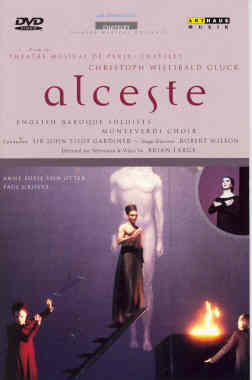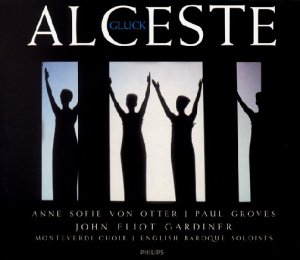

Gluck - Alceste
Anne Sofie von Otter ... Alceste
Paul Groves ... Admète
Dietrich Henschel ... Le Grand Prêtre/Hercule
Yann Beuron ... Evandre
Hjördis Thébault ... Coryphée
Ludovic Tézier ... Un héraut/Apollon
Frédéric Caton ... L'Oracle/Un dieu infernal
ENGLISH BAROQUE SOLOISTS & MONTEVERDI CHOIR
Conductor. SIR JOHN ELIOT GARDINER
Stage Director ROBERT WILSON
Choreographer. GIUSEPPE FRIGENI
Wardrobe. FRIDA PARMEGGIANI
Lighting A J WEISSBARD
Arthaus 100 160 [135 min]
This live Paris performance of Alceste, given at the Théâtre de Châtelet in 1999, is a valuable record of a somewhat unequal collaboration; Gardiner energising the essentially undramatic score with fervour and the vivid timbres of his period orchestra, Wilson's vision cool and ritualistic.
The prevailing colours are blue (not quite as vibrant as Yves Klein's) which are muted and darkened as the situation demands. It is all very chic and undeniably beautiful - for the most part an acceptable if not greatly illuminating visual accompaniment to the dignified realisation of this austere score. There is a mysterious black box which moves around, growing and shrinking like a computer screen saver, representing fate or somesuch.
Does Robert Wilson's way make maximum effect when first encountered? We were bowled over by his Aida at Brussels, due to be brought from Le Monnaie to Covent Garden by Pappano (review extract appended below).
Here in Alceste Wilson's approach seemed to distance engagement with the predicament of the spouses who vie for the privilege of sacrificing themselves the one for the other. By the end the dutiful wife is unshaken in her resolve to give her life to save her husband's (a sub-text which my wife thought might have been reassuring for the men in Gluck's audiences but doesn't recommend itself to today's feminists!).
All is saved by Hercules, whose masculanity and muscular power suffice to challenge the inexorable Gods, signified risibly by whirling gestures which brought to mind a discus thrower or a fast bowler limbering up. Visually, that was the nadir; elsewhere the singers adopted the hieratic poses Wilson prescribed with acquiecence but sometimes falling short of complete assimilation and conviction.
In this reformist opera Gluck had purposely denies the stars
virtuosic opportunities, determined to exclude indulgence of the 'vanity of
singers'. Van Otter's voice seemed a little tight at first, but she soon relaxed
into the nobility of the role and it is good to watch her whilst she sings a
succession of expressive accompanied recitatives and arias. The supporting cast
is fully adequate and the chorus (unseen, in the orchestra pit) is mirrored
on stage by dancers making beguiling patterns. 
A related performance by the same chief participants as in this Paris performance
has been available on CD (Philips) and the cover image gives a characteristic
example of Robert Wilson's stage pictures.
I do not want to be discouraging. The DVD sound is excellent as is the sharpness of the photography; this version is probably no more costly than the CDs (I haven't succeeded inchecking) and it is a valuable record of a famous and well received production.
Nonetheless I would urge prospective purchasers to consider first the remarkable Zurich Iphiginie en Tauride which I reviewed and recommended in conjunction with Strauss's Capriccio, which treats the controversies surrounding Gluck's reforms. It is, frankly, a more interesting Gluck opera than Alceste, and that DVD (also Arthaus) is vastly enhanced by inclusion of the documentary Gluck - The Reformer, illuminating our appreciation by discussions with producer, conductor and cast etc, whereas Alceste is given without any 'extras'.
Peter Grahame Woolf
VERDI AIDA Robert Wilson / Antonio Pappano February 2002 La Monnaie, Brussels http://www.musicweb-international.com/SandH/2002/Mar02/Oper_in_europe.htm
- - Verdi's Aida , premiered lavishly in Cairo 1871, and now at Brussels virtually reinvented by Robert Wilson , triumphantly making it relevant to our times. Aida is a problem opera, holding its place in the popularity stakes with its opportunities for grandiose display on the largest scale, rather than the central human drama, which has often taken second place. Wilson has blown away both the 19th C tradition of fantastical orientalist fantasies - - and dispensed with the sort of gratuitous cruelty in the exercise of power in David Pountney's sometimes incomprehensible production for Munich State Opera, which all but suffocated the music. Wilson has stripped the work to its core elements of emotional conflict and ethical choices. His pared down, but highly sophisticated, staging has created space for the music to speak on equal terms with the visual spectacle. The characters, dressed simply, move formally at a measured pace, maintaining statuesque hieratic poses and hand positions which suggest images familiar from ancient Egyptian art. I found myself comfortably accepting this alien mode of representation immediately, its strangeness a relief from the usual operatic stock gestures, gripping attention and helping to universalise the drama that passed before us, affecting rather than distancing.
This production places Aida in a defamiliarised ancient world which accentuates ever present human conundrums and conflicts. Wilson has created a stunningly beautiful stage picture for the Nile Scene. Warm earth colours indicate the desert beyond a peaceful band of water in the middle distance, the whole suffused with heavenly blue lighting, a perfect counterpoint to the human distress and tragedy unfolding. The casting was notable, the singers working as a team, never upstaging each other, holding onto high notes or exaggerating climaxes of familiar arias. Ildiko Komlosi (Amneris) made a notable debut at Brussels, substituting for the indisposed Elena Zaremba and fitting in easily with Norma Fantini (Aida), Johan Botha (Radames) and Mark S. Doss (Amonasro). Antonio Pappano elicited playing of the highest order, breathlessly intense with sobbing violins underscoring Aida's grief and quiet passages which held the audience spellbound.
This was a production which has lodged in the memory permanently and will come to mind whenever one sees Aida in the future; it is a co-production with the Royal Opera, Covent Garden and Londoners should not miss seeing it there at the earliest opportunity, when Antonio Pappano will be established as Music Director. - -